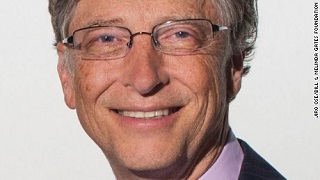Some Billionaires Continue to Pour Support into the Cleantech Cause

I’m reminded of this when I was just now cc’d on a letter to Bill Gates re: a new way of growing plants with a certain type of soil. I respond:
Hi, and Happy New Year to you.
In addition to his work in health, e.g., the eradication of malaria, Gates seems to be most involved in nuclear, but who knows? He’s also building a fund that will empower tons of fledgling cleantech start-ups that are too risky for venture capital.
This happens to be a point I made in my most recent book: Bullish on Renewable Energy – 14 Reasons that Clean Energy Investors Can’t Lose. One of those 14 reasons is that, while many billionaires are happy to enrich themselves further at the expense of the planet, some are totally unwilling to let this happen “on their watch,” and can be counted upon to mobilize efforts that fix the situation with all possible dispatch.
I applaud your attempt to move your idea forward.

Happy New Year Craig,
Craig, you are to be applauded for giving so much of your valuable time to provide much needed and valuable commercial advice to hopeful inventors and clean tech entrepreneurs.
One of the banes of any successful celebrity must be unsolicited pleas for help.
Most successful individuals try to assist as best they can with acts of public and private philanthropy and charity. Because of the huge number of unsolicited approaches, most celebrities employ an expert to sort out the worthy from the inappropriate.
The commodity most highly successful people lack is time. There simply isn’t enough hours in the day to deal with the issues in their owns lives, let alone cope with thousands of requests from total strangers.
Commercializing innovative technology is a highly skilled process. Even with an excellent product, the process requires knowledge, skills and commercial experience, sadly lacking in most hopeful inventors and entrepreneurs.
Capital support is only one aspect of the commercialization process. One of the qualities that separates the successful from the dreamers, is acceptance of responsibility for every aspect of failure.
There’s no obligation for any other individual to accept, invest or endorse any invention or product, except for self interest. (that interest might include altruistic purpose, but it still must appeal to the prospects concept of altruism).
If you define “self-interest” to include altruism, it really doesn’t mean anything at all. Obviously, no one acts without an interest in something they care about.
Craig,
I’m not sure I follow your meaning. Perhaps I didn’t make myself clear, if not, I apologize.
The contest in which I intended my observation to be interpreted was as advice to a person seeking to raise investment capital from others.
When appealing to prospective investors sense of altruism (unselfish act), the prospect still needs to be convinced of the value of the project. Very few of us are completely altruistic. Self interest always plays a role, even the warm glow of knowing a good deed is being done, is a form of self interest.
An investor may support a particular project as an apparent act of philanthropy, but understanding the prospects personal motivation makes obtaining support a much easier process.
Just because an individual is a billionaire, doesn’t make the person more likely to hand out random funding. In fact as is evidenced by your reference to Bill Gates, billionaires are generally very careful with money.